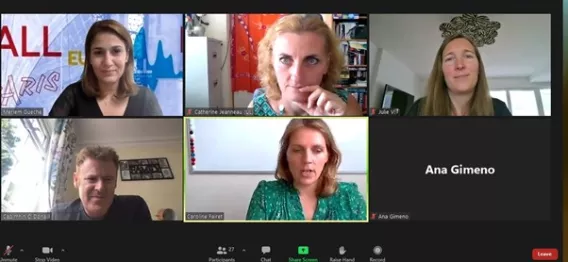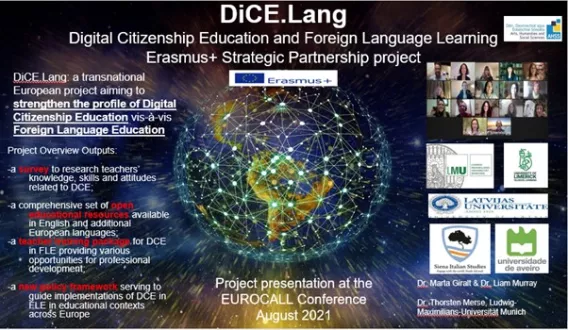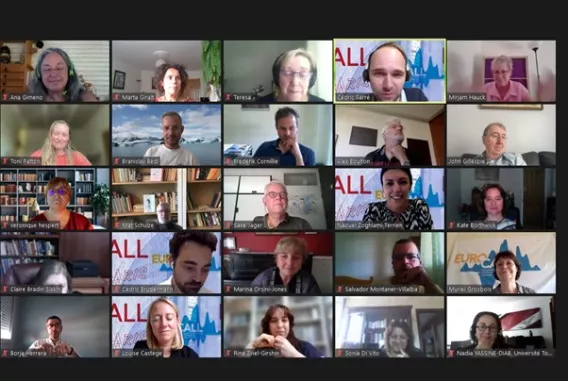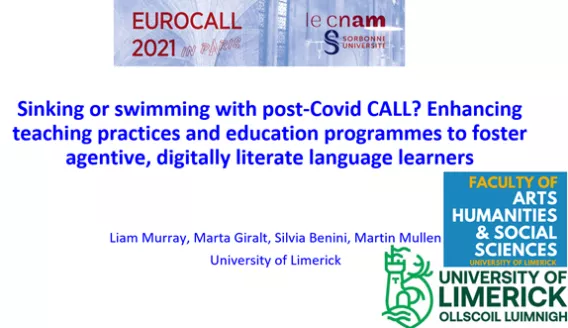

MLAL faculty strongly represented at the online EuroCALL Conference, 26-27 August, with five separate presentations.
Catherine Jeanneau, PhD candidate and coordinator of the Language Learning hub, received funding from the AHSS Faculty Postgraduate Research Committee to give two papers at the annual EuroCALL conference presenting the two European projects of which she is a member.
The first paper, given in collaboration with Dr Catherine Caws from the University of Vancouver, Canada, focused on the theoretical and pedagogical frameworks adopted by the elang project. This project, funded by the ECML (European Centre for Modern Languages of the Council of Europe) is part in their 2020-2023 Programme: Inspiring innovation in language education: changing contexts, evolving competences and includes experts from Austria, Finland, Ireland and France, with associated partners in Canada and Russia. The e-lang citizen project seeks to help language learners become digital citizens and develop the capacity to use digital media critically, creatively and autonomously in several languages.
The second paper was delivered in conjunction with Prof Christian Ollivier, project coordinator from the University of La Réunion, France, and Julie Van de Vyver, from the Université Catholique de Louvain, Belgium. In the presentation, the speakers introduced the Lingu@num project, an Erasmus+ funded Strategic Partnership in the field of Higher Education that aims at promoting innovative practices for language teaching and learning through the relevant use of digital technology, as well as supporting learners and teachers in developing their digital literacy. This project team includes members from France, Belgium, Finland and Ireland.




Dr Martin Mullen also made an individual presentation on the findings and recommendations of a study conducted with students of Modern Languages at the University of Limerick. The study found that despite being heavy users of smartphones and social media in their everyday lives, the device and media platforms did not play a significant role in their language-learning activities, with the learners instead expressing a preference for traditional study resources and behaviours, with their smartphone use limited to use as a dictionary or sporadic use for Edutainment purposes. The recommendations addressed the typical Irish student’s general over-use of smartphones, and under-use for learning, and were aimed at making learners more judicious, more informed, and more critical users of their devices for different purposes, while emphasising the role of the teacher in achieving these aims. The recommendations included firstly an explicit focus on smartphones in both the second and third level classroom, with time dedicated to experimentation, evaluation, and reflection on how the devices can be used. Secondly, structured exposure to the affordances of social media as sources of relevant authentic second-language content which also offer opportunities for interaction was suggested to help learners better harness the language-learning potential of social media.
Dr Marta Giralt on DICE.Lang – Citizenship Education and Foreign Language Learning
Marta gave a presentation reporting on a three year Erasmus + project from the Strategic Partnerships for Higher Education programme, involving 5 European universities which began in October 2020. The University of Munich is leading five European institutions, University of Limerick, University of Latvia, University of Aveiro, and Siena Italian Studies to develop a project that has received a grant from the ERASMUS+ programme. The programme as a whole, is designed to develop and share innovative practices and promote cooperation, peer learning, and exchanges of experiences. Our particular three-year-project aims to strengthen the profile of Digital Citizenship Education (DCE) vis-à-vis foreign language education.
Digital Citizenship Education, as we interpret it, seeks to empower younger citizens to participate actively and responsibly in a digital society and foster their digital technologies skills effectively and critically. In order to facilitate the implementation of DCE in curricula across Europe, subject-specific solutions are required which, at the moment, are still severely lacking. This would include a thorough adaptation of DCE principles and objectives into foreign language education.
The presentation reported on the survey results and discussed some open education resources (OERs) and teacher training samples that would provide teasers for what is to be further developed during the course of the project.
For more information about this project, click this link: https://ec.europa.eu/programmes/erasmus-plus/projects/eplus-project-details/#project/2020-1-DE01-KA203-005712


Finally, Dr Liam Murray led a virtual presentation offering the collaborative work of fellow MLAL researchers, Marta Giralt, Silvia Benini and Martin Mullen. This was a timely topic, with the title: “Sinking or swimming with post-Covid CALL? Enhancing teaching practices and education programmes to foster agentive, digitally literate language learners”. As the title indicates, we sought to explore the impact of the forced online teaching on our teaching practices and how we can enhance the gains from learner autonomy as we move forward in blended post-Covid learning environments. Our student data showed that learner autonomy has been increased and so we have a challenge and responsibility to maintain and enhance such gains in the future. We concluded: ideally, learners would return to the traditional university environment while retaining the agentive and autonomous attributes developed during Covid-19; however, there is a danger that ‘getting back to normal’, and to the comforts of the campus and classroom, might lead to a regression of these attributes and a return to a more passive, teacher-centred form of learning. It is important to identify ways our modules can facilitate the maintenance of these positive learner characteristics when their need is perhaps less immediate to the learners themselves.

Email: ahss@ul.ie
Phone: +353-61-202700
Postal Address: AHSS Faculty Office, University of Limerick, Limerick, Ireland.